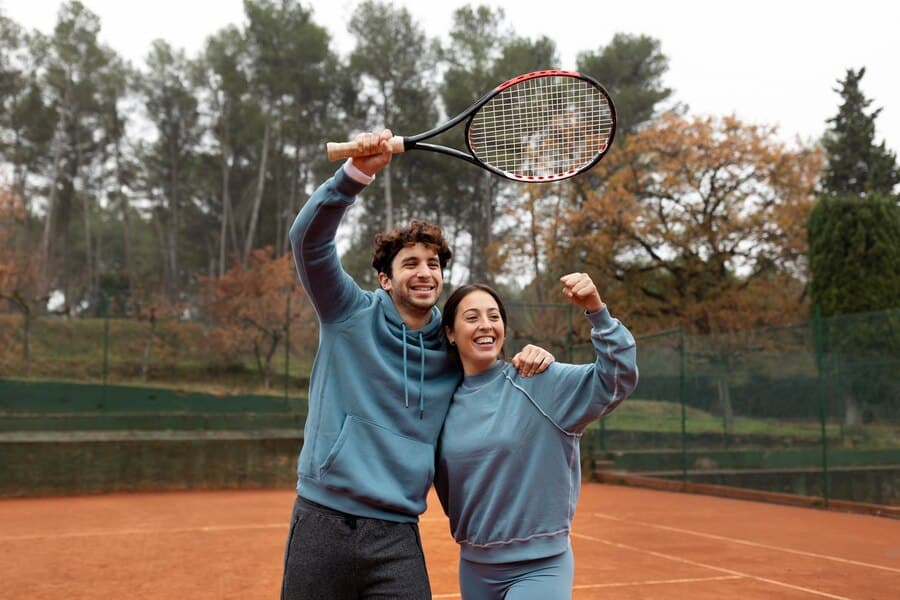Tennis camps recognize the importance of fitness training in enhancing player performance and on-court agility and strength. Traditional workout routines may not adequately prepare tennis players for the physical demands of the sport. Fitness regimens in tennis camps focus on lower body strength, upper body strength, speed and agility, core and rotational strength, endurance, and flexibility. Personal trainers and coaches design science-based and innovative workouts to improve overall fitness levels and prevent injuries.
Key Takeaways:
- Tennis camps prioritize fitness training to enhance player performance and prevent injuries.
- Fitness regimens in tennis camps target specific areas like lower body strength, upper body strength, speed and agility, core and rotational strength, endurance, and flexibility.
- Personal trainers at tennis camps design innovative workouts based on science and player needs.
- Comprehensive fitness training in tennis camps improves overall player performance and contributes to a successful tennis career.
- Tennis camps provide a structured and personalized approach to fitness training, tailored to individual needs and goals.
The Importance of Fitness Training for Tennis Players
Fitness training plays a vital role in the success of tennis players, considering the physical demands of the sport. Tennis requires a combination of lower body strength and explosiveness, upper body strength, speed and agility, core and rotational strength, endurance, and flexibility. These physical attributes are essential for players to excel on the court, prevent injuries, and perform at their best.
Tennis players need to be able to perform high-intensity movements repeatedly, handle quick direction changes, and generate power in shots. Fitness training programs specifically tailored for tennis players address these needs, helping them enhance overall performance and lay the foundation for a successful tennis career.
“Fitness training helps players excel on the court, prevent injuries, and perform at their best.”
By focusing on lower body strength and explosiveness, tennis players develop the power and agility necessary for explosive movements such as sprinting, jumping, and changing direction swiftly. Upper body strength is crucial for generating force in shots, particularly serves and groundstrokes, allowing players to hit the ball effectively and with control.
Core and rotational strength play a significant role in executing powerful and accurate shots while maintaining stability and balance on the court. Endurance enables players to maintain optimal performance throughout long matches, helping them sustain the intensity required to outlast opponents. Flexibility is vital for a full range of motion, facilitating fluid movements and reducing the risk of injuries.
By engaging in comprehensive fitness training, tennis players improve their physical conditioning, which directly translates to improved performance on the court. They become better prepared to handle the demanding physical nature of the sport and are equipped to endure grueling matches.
Furthermore, a well-rounded fitness training program ensures that players maintain the balance between different physical attributes, creating a foundation of athleticism that underpins their performance.
The Role of Personal Trainers in Tennis Camps
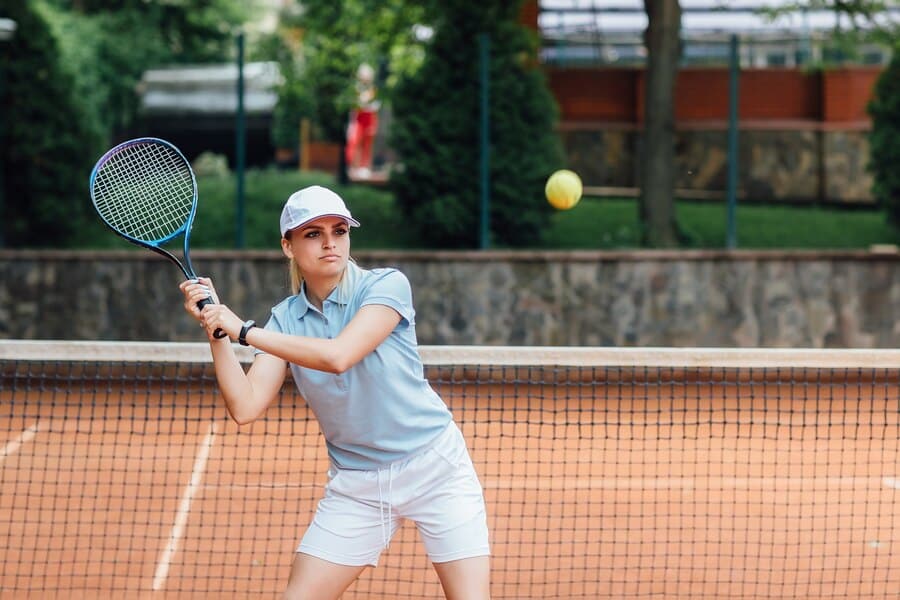
Personal trainers are an integral part of tennis camps, providing specialized expertise in fitness training and innovative workouts. They play a crucial role in designing and implementing fitness programs that cater to the unique needs of tennis players.
Personal trainers in tennis camps possess in-depth knowledge of the physical requirements of the sport, allowing them to develop targeted training regimens. They are skilled in corrective exercise training and injury prevention, ensuring that players can safely maximize their performance on the court.
These trainers focus on functional movement, emphasizing exercises that replicate the movements and demands of tennis. By drawing from various training techniques and methodologies, they create innovative workouts that enhance players’ overall fitness levels.
To stay at the forefront of their field, personal trainers in tennis camps continuously update their knowledge through workshops and studying the movements of professional tennis players. This allows them to incorporate the latest research and methodologies into their training programs, ensuring that players receive effective and personalized fitness regimens.
By working closely with players, personal trainers in tennis camps can tailor their workouts to address each individual’s specific needs and goals. Whether it’s improving strength, agility, endurance, or flexibility, these trainers provide guidance and support to help players reach their full potential.
The role of personal trainers in tennis camps extends beyond physical fitness. They also serve as mentors and motivators, offering guidance and encouragement to help players stay focused and committed to their training.
“Personal trainers in tennis camps play a crucial role in enhancing players’ performance and helping them become well-rounded athletes. Their expertise and dedication ensure that players receive top-notch training and support, setting them up for success in their tennis journey.”
The partnership between personal trainers and tennis camps creates an environment where players can develop their physical abilities, improve their on-court performance, and reach their full potential. Through their knowledge, experience, and innovative training methods, personal trainers contribute significantly to the success of tennis camps.
| Benefits of Personal Trainers in Tennis Camps |
|---|
| 1. Specialized expertise in tennis-specific fitness training |
| 2. Design and implementation of innovative workouts |
| 3. Injury prevention and corrective exercise training |
| 4. Personalized fitness regimens tailored to individual needs |
| 5. Continuous professional development and knowledge updates |
| 6. Mentoring and motivation for players |
Personal trainers in tennis camps play a vital role in ensuring that players receive the best possible fitness training experience. Their expertise, commitment, and tailored approach contribute to the overall success and effectiveness of tennis camps.
Key Components of Tennis Camp Fitness Training
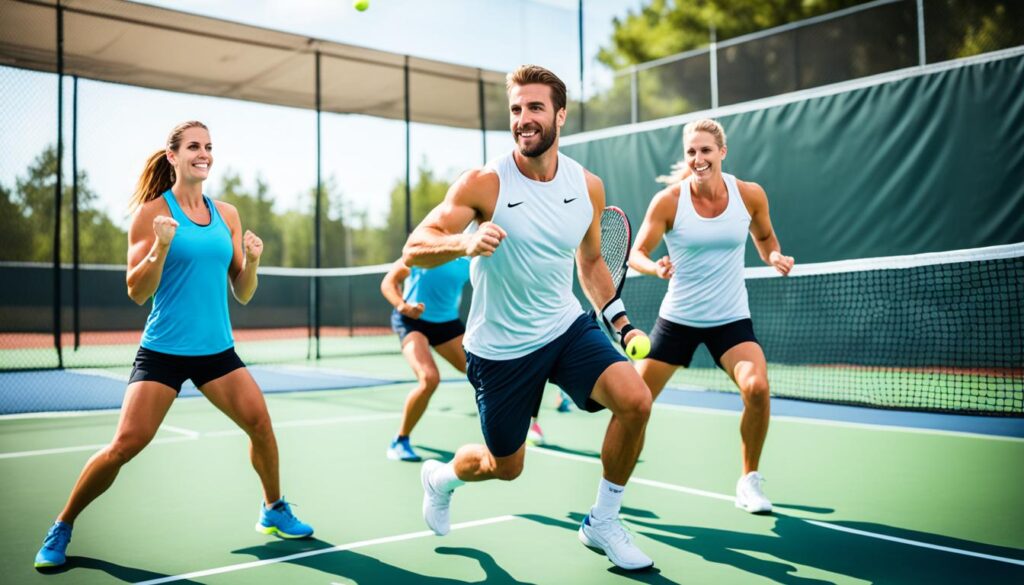
Fitness training in tennis camps incorporates various key components to enhance player performance and prevent injuries. These components are carefully designed to address the specific physical demands of the sport, ensuring that players develop the necessary skills and conditioning. The key components of tennis camp fitness training include:
- Lower body strength
- Upper body strength
- Speed and agility
- Core and rotational strength
- Endurance
- Flexibility
Each of these components plays a vital role in the overall fitness of tennis players and contributes to their success on the court. Let’s take a closer look at how each component benefits players:
Lower Body Strength
Lower body strength is crucial in generating power and explosiveness in shots. It allows players to move quickly and efficiently around the court, enabling them to reach and return challenging shots. Exercises such as lunges, squats, and plyometric drills are incorporated into fitness training to develop lower body strength.
Upper Body Strength
Upper body strength is essential for generating power in serves and shots, as well as maintaining stability and control during rallies. Strength exercises targeting the arms, shoulders, and core muscles help tennis players develop the necessary upper body strength to excel in the sport.
Speed and Agility
Speed and agility are critical components of tennis fitness training. Quick reflexes, lateral movements, and rapid direction changes are all key skills required on the court. Fitness training programs incorporate drills and exercises specifically designed to improve speed, agility, and quickness.
Core and Rotational Strength
A strong core and rotational strength are essential for generating power and stability in tennis strokes. Core exercises such as planks, Russian twists, and medicine ball rotations are incorporated into the training regimen to develop core and rotational strength.
Endurance
Endurance is vital in tennis, as matches can be physically demanding and last for hours. Tennis fitness training includes aerobic exercises, interval training, and endurance-focused drills to improve cardiovascular fitness and stamina.
Flexibility
Flexibility plays a crucial role in preventing injuries and improving overall performance. Stretching exercises, yoga poses, and mobility drills are incorporated into fitness training to enhance flexibility and range of motion, which aids in executing various strokes and movements on the court.
By incorporating these key components into tennis camp fitness training, players can develop a well-rounded fitness foundation that supports their performance and helps prevent injuries.
Individualized Approach to Fitness Training at Tennis Camps
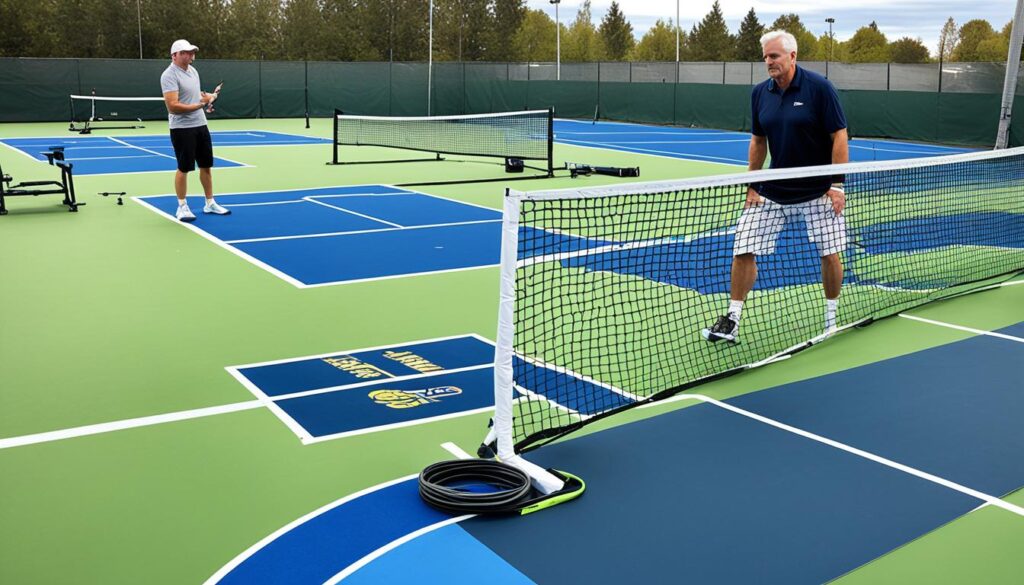
Tennis camps understand that every player has unique needs and goals when it comes to fitness training. That’s why they adopt an individualized approach to cater to each player’s specific requirements. Personalized coaching programs are designed to address areas of improvement and accommodate the player’s fitness level.
Trainers at tennis camps closely monitor each player’s progress and make necessary adjustments to the workouts. This tailored approach ensures that players receive maximum benefits and reach their full potential. By identifying and addressing any weaknesses or imbalances, the trainers also help prevent injuries that may affect performance.
The individualized approach to fitness training at tennis camps creates a supportive environment where players can work on their unique needs and goals. Whether it’s building strength, improving agility and speed, or enhancing endurance, the personalized coaching programs cater to the player’s individual requirements.
Advantages of an Individualized Approach
“The individualized approach to fitness training in tennis camps allows players to focus on their specific needs and goals. This tailored approach ensures that each player receives personalized attention and guidance, resulting in improved performance and reduced risk of injuries.”
By customizing fitness training programs, tennis camps enable players to maximize their fitness levels and optimize their on-court performance. This approach not only addresses the player’s immediate needs but also helps them develop skills and habits that contribute to long-term success in the sport.
To illustrate the effectiveness of an individualized approach to fitness training at tennis camps, consider the following example:
| Tennis Camp Program | Player A | Player B | Player C |
|---|---|---|---|
| Focus Area | Endurance and agility | Strength and power | Speed and mobility |
| Training Plan | A combination of interval training and on-court agility drills | Resistance training with emphasis on upper body strength | High-intensity speed and footwork exercises |
| Outcome | Improved stamina and quickness on the court | Increased power and shot effectiveness | Enhanced speed and agility in game situations |
This table highlights how an individualized approach to fitness training at tennis camps can address specific player needs and lead to targeted improvements. By tailoring the training plans to focus on each player’s requirements, tennis camps ensure that every participant receives the necessary guidance and support to reach their fitness goals.
The individualized approach to fitness training at tennis camps is key to unlocking the full potential of each player. By recognizing and addressing their unique needs, these camps create an environment where individuals can thrive and achieve their best performance on the court.
Benefits of Comprehensive Fitness Training in Tennis Camps
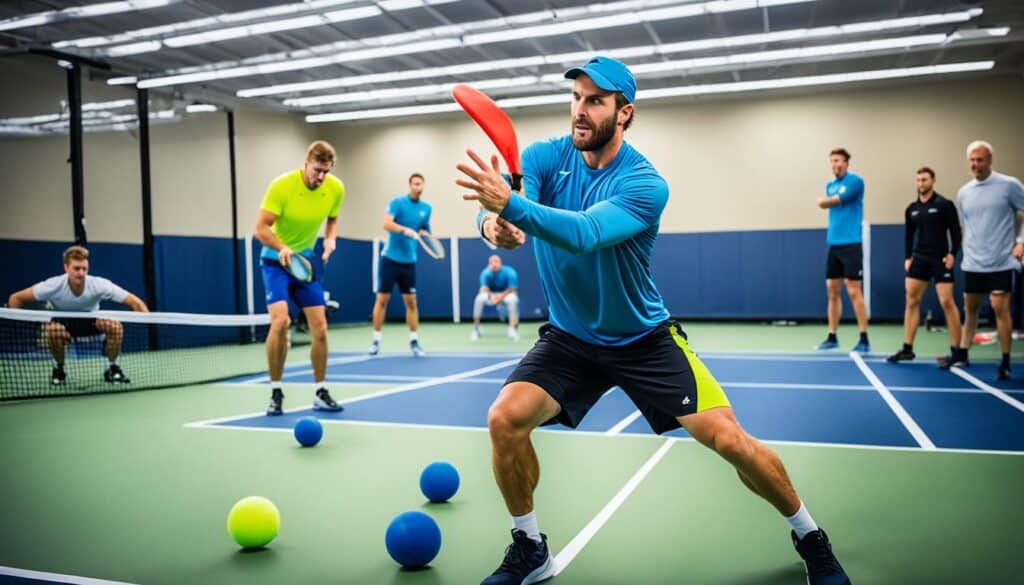
Comprehensive fitness training is an essential component of tennis camps, offering numerous benefits for players. These training programs focus on improving strength, speed, agility, endurance, and flexibility, resulting in enhanced player performance on the court. By incorporating all aspects of fitness, tennis camps aim to develop well-rounded athletes who can excel in their game.
One of the primary advantages of comprehensive fitness training in tennis camps is the reduction of injuries. By strengthening muscles, stabilizing joints, and improving overall physical conditioning, players are better equipped to prevent injuries that could hinder their performance. A strong and conditioned body is more resilient and capable of withstanding the physical demands of tennis.
“With comprehensive fitness training, players can achieve peak physical conditioning, enabling them to perform at their best and reduce the risk of injuries.” – Coach Smith
Furthermore, comprehensive fitness training enhances player performance by improving their strength, speed, and agility. With increased strength, players can generate more power in their shots and move more efficiently on the court. Speed and agility training allows players to react quickly to different situations, reaching the ball faster and gaining a competitive edge over opponents.
In addition to performance enhancement and injury prevention, comprehensive fitness training in tennis camps helps create a well-rounded athlete. These programs focus on improving overall physical conditioning, including cardiovascular endurance and flexibility, ensuring players have the physical foundation to compete at their best.
The benefits of comprehensive fitness training in tennis camps extend beyond the court. Players who participate in these training programs develop discipline, dedication, and perseverance, qualities that can be applied to all areas of their lives. By instilling these values, tennis camps contribute to the holistic development of individuals.
Benefits of Comprehensive Fitness Training in Tennis Camps
| Benefits | Description |
|---|---|
| Enhanced player performance | Improved strength, speed, and agility result in better performance on the court. |
| Injury prevention | Reduced risk of injuries through muscle strengthening and joint stabilization. |
| Physical conditioning | Improved cardiovascular endurance and flexibility for overall fitness. |
| Character development | Developing qualities such as discipline, dedication, and perseverance. |
Comprehensive fitness training in tennis camps is a valuable investment for players looking to maximize their potential and achieve long-term success in the sport. By focusing on the development of strength, speed, agility, and overall physical conditioning, tennis camps contribute to the growth of well-rounded athletes who can excel both on and off the court.
Tennis Camps as a Learning Opportunity for Fitness Training
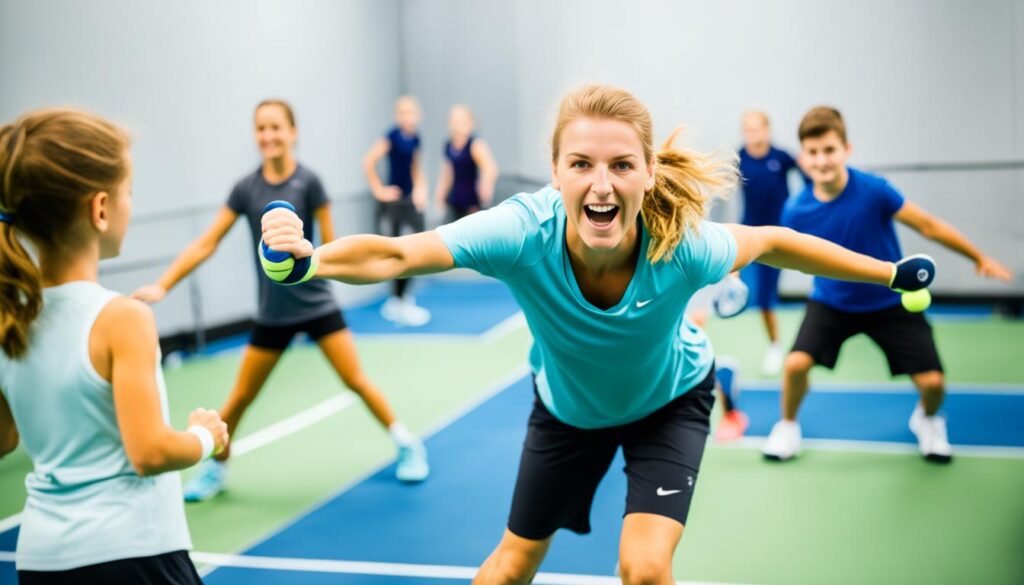
Tennis camps offer much more than just improving tennis skills. They provide an exceptional learning opportunity for fitness training, allowing players of all skill levels to enhance their overall performance and reach their full potential.
At tennis camps, participants have the chance to learn new exercises and techniques that are specifically tailored to improve their game. Coaches and trainers at these camps are experts in identifying players’ strengths and weaknesses. They develop customized fitness programs that focus on skill advancement and cater to each individual’s needs.
The structured environment of a tennis camp allows players to concentrate on specific areas of improvement, whether it’s building strength, improving agility, or enhancing endurance. With expert guidance, players can focus on targeted fitness training that complements their tennis skills.
Moreover, tennis camps provide access to dedicated coaching programs that are designed to nurture skill advancement. These coaching programs incorporate fitness training as an integral component, ensuring that players not only develop their tennis abilities but also improve their overall fitness levels.
The combination of tennis skills and fitness training in a supportive learning environment creates a holistic approach to player development. By participating in fitness training at tennis camps, players can enhance their on-court performance, prevent injuries, and become well-rounded athletes.
Benefits of Fitness Training at Tennis Camps:
- Opportunity to learn new exercises and techniques for game improvement
- Customized fitness programs tailored to individual needs
- Structured environment for targeted skill advancement
- Expert guidance from coaches and trainers
- Focus on overall fitness levels
- Enhanced performance on the court
- Injury prevention through proper conditioning
- Development of well-rounded athletic abilities
Participating in fitness training at tennis camps not only enhances players’ skills but also instills a long-lasting commitment to maintaining physical fitness, which can benefit them throughout their tennis careers and beyond.
With the unique learning environment and specialized coaching available at tennis camps, players have the opportunity to take their fitness training to the next level. By integrating fitness training into their tennis practice, players can advance their skills, improve their overall performance, and set the foundation for a successful tennis career.
Additional Benefits of Attending Tennis Camps
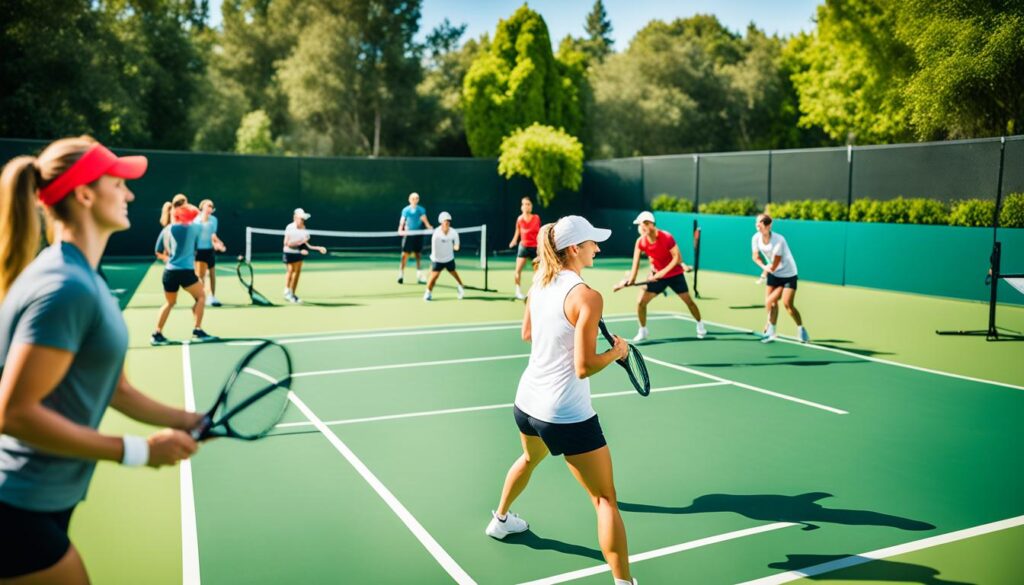
In addition to the valuable fitness training, attending tennis camps offers a host of other benefits that contribute to a well-rounded experience.
Players have the opportunity to meet and learn from mentors, including professional players and coaches who share their experiences and provide valuable insights. This exposure to seasoned athletes can greatly enhance a player’s understanding of the game and offer inspiration to reach new heights.
Tennis camps also prioritize teaching good sportsmanship, ethics, and the importance of following rules. These values are instilled in players through structured activities, competitive play, and positive reinforcement. Developing strong sportsmanship skills not only affects a player’s behavior on the court but also extends to their interactions off the court.
Camps provide players with the chance to make valuable connections that can open doors to opportunities in clubs, colleges, and professional tennis. These connections can lead to lifelong friendships and influential relationships within the tennis community.
Attending tennis camps also aids in the development of essential time management skills. Camp schedules are designed to maximize productivity and balance between training and other activities, teaching players how to effectively manage their time and prioritize their commitments.
The combination of hard work, learning, and fun activities creates an environment that is not only rewarding but also enjoyable for camp participants. Tennis camps are known for offering a range of recreational and team-building activities, fostering new friendships with like-minded individuals and creating memories that last a lifetime.
Overall, attending tennis camps serves as a catalyst for personal growth and skill development. The benefits extend beyond the scope of fitness training and provide players with a comprehensive experience that encompasses mentorship, sportsmanship, connections, time management, friendships, and a myriad of fun-filled activities.
Who Should Attend Tennis Camps?
Tennis camps cater to a wide range of individuals, including:
- Junior players: Tennis camps provide young players with the opportunity to learn and develop their skills in a structured environment. Junior camps focus on age-appropriate training techniques and provide coaching tailored to the needs of young athletes. These camps aim to foster a love for the sport and provide a solid foundation for future tennis endeavors.
- Adult players: Tennis camps also cater to adult players of all skill levels. Whether you’re a beginner looking to learn the basics, an intermediate player seeking to refine your technique, or an advanced player aiming to take your game to the next level, there are adult camps that can meet your needs. These camps offer personalized coaching programs to address specific goals and challenges.
- High-level players: For high-level players aspiring to compete at the highest level, there are elite tennis camps that provide intensive training programs. These camps focus on advanced techniques, match strategy, physical conditioning, and mental preparation. They offer an opportunity to train with other highly skilled players and learn from experienced coaches with a track record of success.
- Students: Tennis camps are an excellent option for students who want to combine their passion for the sport with academic pursuits. Many tennis camps offer flexible schedules and accommodate academic commitments, allowing students to balance their training with their studies. These camps provide a supportive environment where students can continue their tennis development while pursuing their educational goals.
Whether you’re a junior player, an adult player, a high-level player, or a student, attending a tennis camp can provide valuable opportunities for skill development, training, and overall growth in the sport.
“Tennis camps offer a diverse range of programs that cater to players of all ages and skill levels. It’s a great way to immerse yourself in the sport, receive expert coaching, and connect with fellow tennis enthusiasts.”
Also Read: Ultimate Guide For Aspiring Tennis Player
Conclusion
Tennis camps are essential for aspiring players to excel in the sport. These camps understand the significance of fitness training in enhancing player performance, improving skills, and preventing injuries. By offering personalized coaching programs and comprehensive fitness regimens, tennis camps create an optimal learning environment for players to maximize their potential and become well-rounded athletes.
Attending a tennis camp comes with various benefits beyond fitness training. Players have the opportunity to learn from experienced mentors, improve their sportsmanship, and make valuable connections within the tennis community. Moreover, tennis camps foster time management skills and provide avenues for building friendships with like-minded individuals.
Whether you are a beginner, intermediate, or advanced player, participating in a tennis camp can contribute to long-term success in the sport. So, enroll in a tennis camp today to experience the transformative power of fitness training and unlock your true potential on the court!
FAQs
Q: How do tennis camps incorporate fitness training?
A: Tennis camps usually include fitness training as part of their daily schedule. This may involve activities such as warm-up routines, strength training exercises, agility drills, and cardio workouts to help campers improve their overall physical fitness.
Q: What is the typical age range for participants in tennis camps?
A: Tennis camps are often open to campers between the ages of 8-18. Some camps may cater specifically to junior tennis players in this age range.
Q: Can you provide an overview of a sample daily schedule at a tennis camp?
A: A typical daily schedule at a tennis camp may include morning fitness training, followed by tennis instruction sessions, match play or tournaments, mental toughness training, and video analysis of player performance. Meals and downtime are also usually incorporated into the schedule.
Q: What are the facilities like at a tennis camp?
A: Tennis camps are usually held at tennis centers or facilities that have multiple courts, training equipment, locker rooms, and sometimes overnight accommodations for campers. Some camps may also have on-site supervision and medical staff for camper safety.
Q: How much does it typically cost to attend a tennis camp?
A: The price of attending a tennis camp can vary depending on factors such as the duration of the session, the facilities offered, the level of instruction, and whether it is an overnight camp or day camp. Prices can range from a few hundred to several thousand dollars per session.
Q: Are tennis camps suitable for beginners or recreational players?
A: Tennis camps cater to a wide range of skill levels, from beginners to advanced players. Camps may offer different instruction levels or group players according to their skill level to ensure that everyone can benefit from the experience.
Q: Where are tennis camps usually located?
A: Tennis camps can be found in various locations, including local tennis centers, universities, resorts, or specialized tennis academies. Camps may be held in different cities or even internationally, providing campers with a diverse range of options.
Q: How are tennis camps supervised to ensure camper safety?
A: Tennis camps typically have trained coaches, instructors, and staff members who oversee campers during activities, meals, and free time. Camps may also have specific protocols in place for check-in, check-out, medical emergencies, and supervision to ensure a safe and enjoyable experience for all participants.
